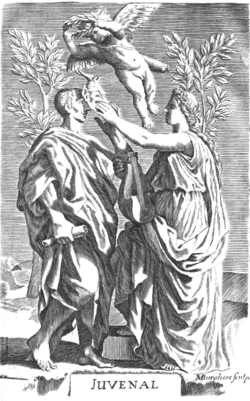Juvenal Quote
One man meets an infamous punishment for that crime which confers a diadem upon another.
Tags:
punishment
Related Quotes
Savers have to be punished so debtors can be saved.Why? Because if debtors are rescued, that makes it possible for more debts to be issued in the future.And why is that important? Because the banking...
Chris Martenson
Tags:
banking, banking system, banks, corrupt, corruption, debt, debtor, economics, economy, finance
Whilst on board the Beagle I was quite orthodox, and I remember being heartily laughed at by several of the officers... for quoting the Bible as an unanswerable authority on some point of morality......
Charles Darwin
Tags:
atheism, autobiography, belief, charles darwin, damnable, divine revelation, doctrine, doubt, evidence, hell
One's suffering, one's melancholy is, in itself, really only looked upon as failure or as punishment, as detestable or sinful or socially unacceptable in the eyes of man; but this is not so in the eye...
Criss Jami
Tags:
adversity, affliction, anxiety, apologetics, broken, broken heart, caring, christ, compassion, crushed
Justice requires not only the ceasing and desisting of injustice but also requires either punishment or reparation for injuries and damages inflicted for prior wrongdoing. The essence of justice is th...
Amos Wilson
Tags:
ancestors, compensation, damages, economic, exploit, exploitation, inequality, inflicted, inherited, injuries
About Juvenal
Decimus Junius Juvenalis (Latin: [ˈdɛkɪmʊs ˈjuːniʊs jʊwɛˈnaːlɪs]), known in English as Juvenal ( JOO-vən-əl; c. 55–128), was a Roman poet. He is the author of the Satires, a collection of satirical poems. The details of Juvenal's life are unclear, but references in his works to people from the late first and early second centuries AD suggest that he began writing no earlier than that time. One recent scholar argues that his first book was published in 100 or 101. A reference to a political figure dates his fifth and final surviving book to sometime after 127.
Juvenal wrote at least 16 poems in the verse form dactylic hexameter. These poems cover a range of Roman topics. This follows Lucilius—the originator of the Roman satire genre, and it fits within a poetic tradition that also includes Horace and Persius. The Satires are a vital source for the study of ancient Rome from a number of perspectives, although their comic mode of expression makes it problematic to accept the content as strictly factual. At first glance the Satires could be read as a critique of Rome.
Juvenal wrote at least 16 poems in the verse form dactylic hexameter. These poems cover a range of Roman topics. This follows Lucilius—the originator of the Roman satire genre, and it fits within a poetic tradition that also includes Horace and Persius. The Satires are a vital source for the study of ancient Rome from a number of perspectives, although their comic mode of expression makes it problematic to accept the content as strictly factual. At first glance the Satires could be read as a critique of Rome.
